- Date: December 10, 2024 - December 15, 2024
Where: Advances in Neural Processing Systems (NeurIPS)
MERL Contacts: Petros T. Boufounos; Matthew Brand; Ankush Chakrabarty; Anoop Cherian; François Germain; Toshiaki Koike-Akino; Christopher R. Laughman; Jonathan Le Roux; Jing Liu; Suhas Lohit; Tim K. Marks; Yoshiki Masuyama; Kieran Parsons; Kuan-Chuan Peng; Diego Romeres; Pu (Perry) Wang; Ye Wang; Gordon Wichern
Research Areas: Artificial Intelligence, Communications, Computational Sensing, Computer Vision, Control, Data Analytics, Dynamical Systems, Machine Learning, Multi-Physical Modeling, Optimization, Robotics, Signal Processing, Speech & Audio, Human-Computer Interaction, Information Security
Brief - MERL researchers will attend and present the following papers at the 2024 Advances in Neural Processing Systems (NeurIPS) Conference and Workshops.
1. "RETR: Multi-View Radar Detection Transformer for Indoor Perception" by Ryoma Yataka (Mitsubishi Electric), Adriano Cardace (Bologna University), Perry Wang (Mitsubishi Electric Research Laboratories), Petros Boufounos (Mitsubishi Electric Research Laboratories), Ryuhei Takahashi (Mitsubishi Electric). Main Conference. https://neurips.cc/virtual/2024/poster/95530
2. "Evaluating Large Vision-and-Language Models on Children's Mathematical Olympiads" by Anoop Cherian (Mitsubishi Electric Research Laboratories), Kuan-Chuan Peng (Mitsubishi Electric Research Laboratories), Suhas Lohit (Mitsubishi Electric Research Laboratories), Joanna Matthiesen (Math Kangaroo USA), Kevin Smith (Massachusetts Institute of Technology), Josh Tenenbaum (Massachusetts Institute of Technology). Main Conference, Datasets and Benchmarks track. https://neurips.cc/virtual/2024/poster/97639
3. "Probabilistic Forecasting for Building Energy Systems: Are Time-Series Foundation Models The Answer?" by Young-Jin Park (Massachusetts Institute of Technology), Jing Liu (Mitsubishi Electric Research Laboratories), François G Germain (Mitsubishi Electric Research Laboratories), Ye Wang (Mitsubishi Electric Research Laboratories), Toshiaki Koike-Akino (Mitsubishi Electric Research Laboratories), Gordon Wichern (Mitsubishi Electric Research Laboratories), Navid Azizan (Massachusetts Institute of Technology), Christopher R. Laughman (Mitsubishi Electric Research Laboratories), Ankush Chakrabarty (Mitsubishi Electric Research Laboratories). Time Series in the Age of Large Models Workshop.
4. "Forget to Flourish: Leveraging Model-Unlearning on Pretrained Language Models for Privacy Leakage" by Md Rafi Ur Rashid (Penn State University), Jing Liu (Mitsubishi Electric Research Laboratories), Toshiaki Koike-Akino (Mitsubishi Electric Research Laboratories), Shagufta Mehnaz (Penn State University), Ye Wang (Mitsubishi Electric Research Laboratories). Workshop on Red Teaming GenAI: What Can We Learn from Adversaries?
5. "Spatially-Aware Losses for Enhanced Neural Acoustic Fields" by Christopher Ick (New York University), Gordon Wichern (Mitsubishi Electric Research Laboratories), Yoshiki Masuyama (Mitsubishi Electric Research Laboratories), François G Germain (Mitsubishi Electric Research Laboratories), Jonathan Le Roux (Mitsubishi Electric Research Laboratories). Audio Imagination Workshop.
6. "FV-NeRV: Neural Compression for Free Viewpoint Videos" by Sorachi Kato (Osaka University), Takuya Fujihashi (Osaka University), Toshiaki Koike-Akino (Mitsubishi Electric Research Laboratories), Takashi Watanabe (Osaka University). Machine Learning and Compression Workshop.
7. "GPT Sonography: Hand Gesture Decoding from Forearm Ultrasound Images via VLM" by Keshav Bimbraw (Worcester Polytechnic Institute), Ye Wang (Mitsubishi Electric Research Laboratories), Jing Liu (Mitsubishi Electric Research Laboratories), Toshiaki Koike-Akino (Mitsubishi Electric Research Laboratories). AIM-FM: Advancements In Medical Foundation Models: Explainability, Robustness, Security, and Beyond Workshop.
8. "Smoothed Embeddings for Robust Language Models" by Hase Ryo (Mitsubishi Electric), Md Rafi Ur Rashid (Penn State University), Ashley Lewis (Ohio State University), Jing Liu (Mitsubishi Electric Research Laboratories), Toshiaki Koike-Akino (Mitsubishi Electric Research Laboratories), Kieran Parsons (Mitsubishi Electric Research Laboratories), Ye Wang (Mitsubishi Electric Research Laboratories). Safe Generative AI Workshop.
9. "Slaying the HyDRA: Parameter-Efficient Hyper Networks with Low-Displacement Rank Adaptation" by Xiangyu Chen (University of Kansas), Ye Wang (Mitsubishi Electric Research Laboratories), Matthew Brand (Mitsubishi Electric Research Laboratories), Pu Wang (Mitsubishi Electric Research Laboratories), Jing Liu (Mitsubishi Electric Research Laboratories), Toshiaki Koike-Akino (Mitsubishi Electric Research Laboratories). Workshop on Adaptive Foundation Models.
10. "Preference-based Multi-Objective Bayesian Optimization with Gradients" by Joshua Hang Sai Ip (University of California Berkeley), Ankush Chakrabarty (Mitsubishi Electric Research Laboratories), Ali Mesbah (University of California Berkeley), Diego Romeres (Mitsubishi Electric Research Laboratories). Workshop on Bayesian Decision-Making and Uncertainty. Lightning talk spotlight.
11. "TR-BEACON: Shedding Light on Efficient Behavior Discovery in High-Dimensions with Trust-Region-based Bayesian Novelty Search" by Wei-Ting Tang (Ohio State University), Ankush Chakrabarty (Mitsubishi Electric Research Laboratories), Joel A. Paulson (Ohio State University). Workshop on Bayesian Decision-Making and Uncertainty.
12. "MEL-PETs Joint-Context Attack for the NeurIPS 2024 LLM Privacy Challenge Red Team Track" by Ye Wang (Mitsubishi Electric Research Laboratories), Tsunato Nakai (Mitsubishi Electric), Jing Liu (Mitsubishi Electric Research Laboratories), Toshiaki Koike-Akino (Mitsubishi Electric Research Laboratories), Kento Oonishi (Mitsubishi Electric), Takuya Higashi (Mitsubishi Electric). LLM Privacy Challenge. Special Award for Practical Attack.
13. "MEL-PETs Defense for the NeurIPS 2024 LLM Privacy Challenge Blue Team Track" by Jing Liu (Mitsubishi Electric Research Laboratories), Ye Wang (Mitsubishi Electric Research Laboratories), Toshiaki Koike-Akino (Mitsubishi Electric Research Laboratories), Tsunato Nakai (Mitsubishi Electric), Kento Oonishi (Mitsubishi Electric), Takuya Higashi (Mitsubishi Electric). LLM Privacy Challenge. Won 3rd Place Award.
MERL members also contributed to the organization of the Multimodal Algorithmic Reasoning (MAR) Workshop (https://marworkshop.github.io/neurips24/). Organizers: Anoop Cherian (Mitsubishi Electric Research Laboratories), Kuan-Chuan Peng (Mitsubishi Electric Research Laboratories), Suhas Lohit (Mitsubishi Electric Research Laboratories), Honglu Zhou (Salesforce Research), Kevin Smith (Massachusetts Institute of Technology), Tim K. Marks (Mitsubishi Electric Research Laboratories), Juan Carlos Niebles (Salesforce AI Research), Petar Veličković (Google DeepMind).
-
- Date & Time: Tuesday, November 19, 2024; 1:30-2:10pm
Location: Virtual Event
Speaker: Prof. Na Li, Harvard University Brief - MERL is excited to announce the featured keynote speaker for our Virtual Open House (VOH) 2024: Prof. Na Li from Harvard University.
Our VOH this year will take place on November 19th, 1:00pm - 4:30pm (EST). Prof. Li’s talk is scheduled for 1:30-2:10pm (EST). For details and agenda of the event, please visit: https://merl.com/events/voh24
Join us to learn more about who we are, what we do, and discuss our internship, post-doc, and full-time employment opportunities. To register, go to: https://mailchi.mp/merl/voh24
Title: Representation-based Learning and Control for Dynamical Systems
Abstract: The explosive growth of machine learning and data-driven methodologies have revolutionized numerous fields. Yet, the translation of these successes to the domain of dynamical physical systems remains a significant challenge. Closing the loop from data to actions in these systems faces many difficulties, stemming from the need for sample efficiency and computational feasibility, along with many other requirements such as verifiability, robustness, and safety. In this talk, we bridge this gap by introducing innovative representations to develop nonlinear stochastic control and reinforcement learning methods. Key in the representation is to represent the stochastic, nonlinear dynamics linearly onto a nonlinear feature space. We present a comprehensive framework to develop control and learning strategies which achieve efficiency, safety, robustness, and scalability with provable performance. We also show how the representation could be used to close the sim-to-real gap. Lastly, we will briefly present some concrete real-world applications, discussing how domain knowledge is applied in practice to further close the loop from data to actions.
-
- Date & Time: Wednesday, May 29, 2024; 12:00 PM
Speaker: Chuchu Fan, MIT
MERL Host: Abraham P. Vinod
Research Areas: Artificial Intelligence, Control, Machine Learning
Abstract 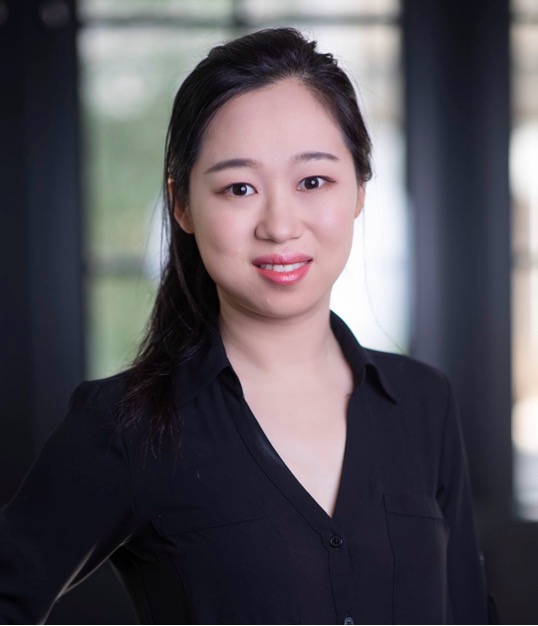 Learning-enabled control systems have demonstrated impressive empirical performance on challenging control problems in robotics. However, this performance often arrives with the trade-off of diminished transparency and the absence of guarantees regarding the safety and stability of the learned controllers. In recent years, new techniques have emerged to provide these guarantees by learning certificates alongside control policies — these certificates provide concise, data-driven proofs that guarantee the safety and stability of the learned control system. These methods not only allow the user to verify the safety of a learned controller but also provide supervision during training, allowing safety and stability requirements to influence the training process itself. In this talk, we present two exciting updates on neural certificates. In the first work, we explore the use of graph neural networks to learn collision-avoidance certificates that can generalize to unseen and very crowded environments. The second work presents a novel reinforcement learning approach that can produce certificate functions with the policies while addressing the instability issues in the optimization process. Finally, if time permits, I will also talk about my group's recent work using LLM and domain-specific task and motion planners to allow natural language as input for robot planning.
Learning-enabled control systems have demonstrated impressive empirical performance on challenging control problems in robotics. However, this performance often arrives with the trade-off of diminished transparency and the absence of guarantees regarding the safety and stability of the learned controllers. In recent years, new techniques have emerged to provide these guarantees by learning certificates alongside control policies — these certificates provide concise, data-driven proofs that guarantee the safety and stability of the learned control system. These methods not only allow the user to verify the safety of a learned controller but also provide supervision during training, allowing safety and stability requirements to influence the training process itself. In this talk, we present two exciting updates on neural certificates. In the first work, we explore the use of graph neural networks to learn collision-avoidance certificates that can generalize to unseen and very crowded environments. The second work presents a novel reinforcement learning approach that can produce certificate functions with the policies while addressing the instability issues in the optimization process. Finally, if time permits, I will also talk about my group's recent work using LLM and domain-specific task and motion planners to allow natural language as input for robot planning.
-
- Date & Time: Wednesday, April 10, 2024; 12:00 PM
Speaker: Na Li, Harvard University
MERL Host: Yebin Wang
Research Areas: Control, Dynamical Systems, Machine Learning
Abstract 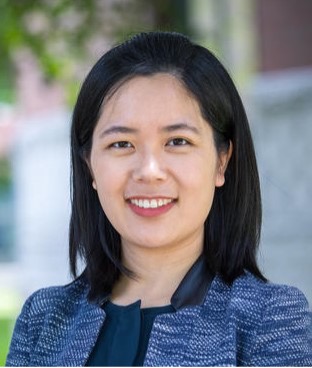 The explosive growth of machine learning and data-driven methodologies have revolutionized numerous fields. Yet, translating these successes to the domain of dynamical, physical systems remains a significant challenge, hindered by the complex and often unpredictable nature of such environments. Closing the loop from data to actions in these systems faces many difficulties, stemming from the need for sample efficiency and computational feasibility amidst intricate dynamics, along with many other requirements such as verifiability, robustness, and safety. In this talk, we bridge this gap by introducing innovative approaches that harness representation-based methods, domain knowledge, and the physical structures of systems. We present a comprehensive framework that integrates these components to develop reinforcement learning and control strategies that are not only tailored for the complexities of physical systems but also achieve efficiency, safety, and robustness with provable performance.
The explosive growth of machine learning and data-driven methodologies have revolutionized numerous fields. Yet, translating these successes to the domain of dynamical, physical systems remains a significant challenge, hindered by the complex and often unpredictable nature of such environments. Closing the loop from data to actions in these systems faces many difficulties, stemming from the need for sample efficiency and computational feasibility amidst intricate dynamics, along with many other requirements such as verifiability, robustness, and safety. In this talk, we bridge this gap by introducing innovative approaches that harness representation-based methods, domain knowledge, and the physical structures of systems. We present a comprehensive framework that integrates these components to develop reinforcement learning and control strategies that are not only tailored for the complexities of physical systems but also achieve efficiency, safety, and robustness with provable performance.
-
- Date & Time: Wednesday, April 3, 2024; 12:00 PM
Speaker: Fadel Adib, MIT & Cartesian
MERL Host: Wael H. Ali
Research Areas: Computational Sensing, Dynamical Systems, Signal Processing
Abstract 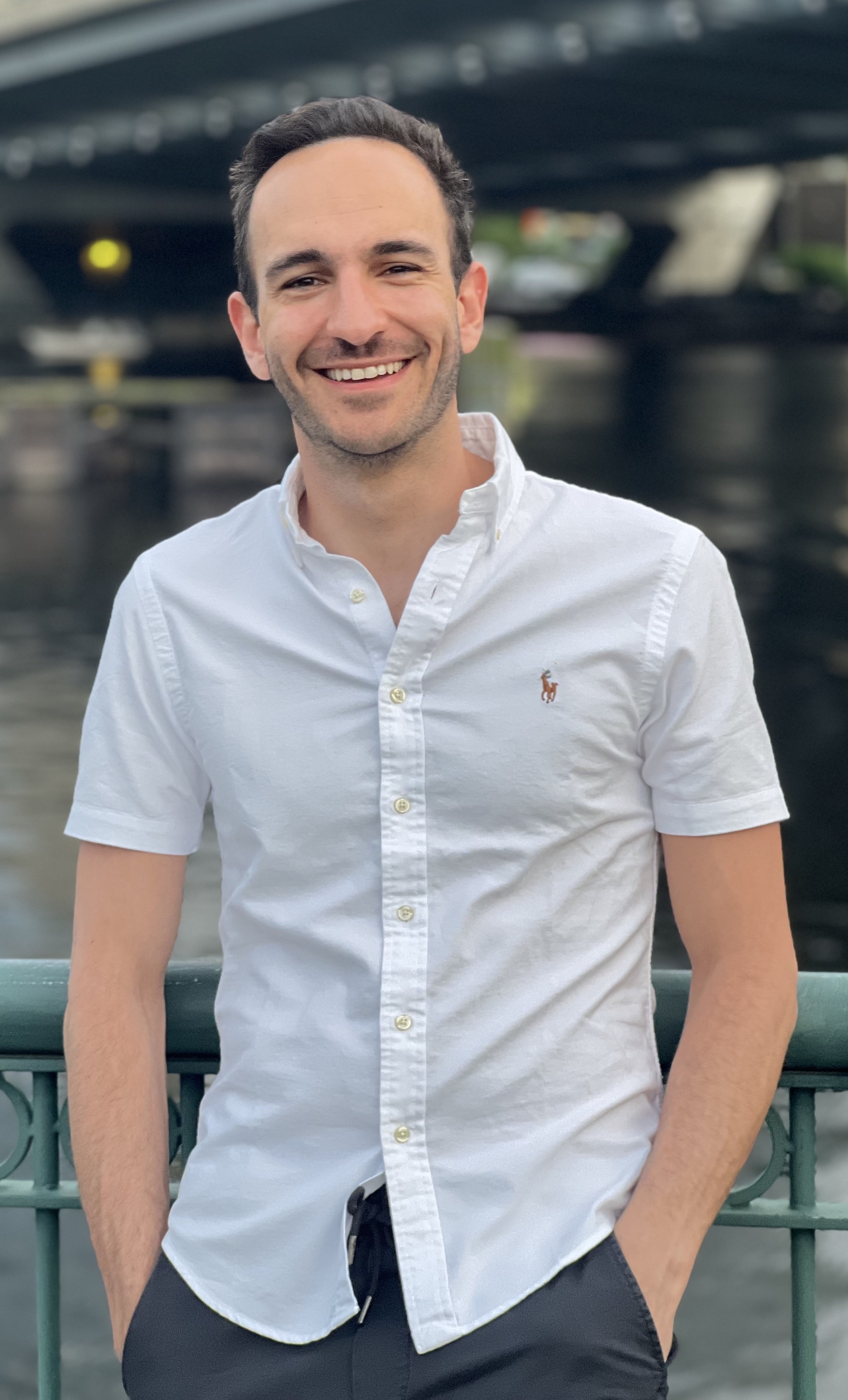 This talk will cover a new generation of technologies that can sense, connect, and perceive the physical world in unprecedented ways. These technologies can uncover hidden worlds around us, promising transformative impact on areas spanning climate change monitoring, ocean mapping, healthcare, food security, supply chain, and even extraterrestrial exploration.
This talk will cover a new generation of technologies that can sense, connect, and perceive the physical world in unprecedented ways. These technologies can uncover hidden worlds around us, promising transformative impact on areas spanning climate change monitoring, ocean mapping, healthcare, food security, supply chain, and even extraterrestrial exploration.
The talk will cover four core technologies invented by Prof. Adib and his team. The first is an ocean internet-of-things (IoT) that uses battery-free sensors for climate change monitoring, marine life discovery, and seafood production (aquaculture). The second is a new perception technology that enables robots to sense and manipulate hidden objects. The third is a new augmented reality headset with ``X-ray vision”, which extends human perception beyond line-of-sight. The fourth is a wireless sensing technology that can “see through walls” and monitor people’s vital signs (including their breathing, heart rate, and emotions), enabling smart environments that sense humans requiring any contact with the human body.
The talk will touch on the journey of these technologies from their inception at MIT to international collaborations and startups that are translating them to real-world impact in areas spanning healthcare, climate change, and supply chain.
-
- Date & Time: Tuesday, September 19, 2023; 1:00 PM
Speaker: Faruque Hasan, Texas A&M University
MERL Host: Scott A. Bortoff
Research Areas: Applied Physics, Machine Learning, Multi-Physical Modeling, Optimization
Abstract 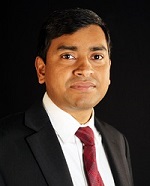 Carbon capture, utilization, and storage (CCUS) is a promising pathway to decarbonize fossil-based power and industrial sectors and is a bridging technology for a sustainable transition to a net-zero emission energy future. This talk aims to provide an overview of design and optimization of CCUS systems. I will also attempt to give a brief perspective on emerging interests in process systems engineering research (e.g., systems integration, multiscale modeling, strategic planning, and optimization under uncertainty). The purpose is not to cover all aspects of PSE research for CCUS but rather to foster discussion by presenting some plausible future directions and ideas.
Carbon capture, utilization, and storage (CCUS) is a promising pathway to decarbonize fossil-based power and industrial sectors and is a bridging technology for a sustainable transition to a net-zero emission energy future. This talk aims to provide an overview of design and optimization of CCUS systems. I will also attempt to give a brief perspective on emerging interests in process systems engineering research (e.g., systems integration, multiscale modeling, strategic planning, and optimization under uncertainty). The purpose is not to cover all aspects of PSE research for CCUS but rather to foster discussion by presenting some plausible future directions and ideas.
-
- Date & Time: Tuesday, February 14, 2023; 12:00 PM
Speaker: Stefanie Tellex, Brown University
MERL Host: Daniel N. Nikovski
Research Area: Robotics
Abstract - Robots can act as a force multiplier for people, whether a robot assisting an astronaut with a repair on the International Space station, a UAV taking flight over our cities, or an autonomous vehicle driving through our streets. Existing approaches use action-based representations that do not capture the goal-based meaning of a language expression and do not generalize to partially observed environments. The aim of my research program is to create autonomous robots that can understand complex goal-based commands and execute those commands in partially observed, dynamic environments. I will describe demonstrations of object-search in a POMDP setting with information about object locations provided by language, and mapping between English and Linear Temporal Logic, enabling a robot to understand complex natural language commands in city-scale environments. These advances represent steps towards robots that interpret complex natural language commands in partially observed environments using a decision theoretic framework.
-
- Date & Time: Tuesday, May 3, 2022; 1:00 PM
Speaker: Michael Posa, University of Pennsylvania
MERL Host: Devesh K. Jha
Research Areas: Control, Optimization, Robotics
Abstract 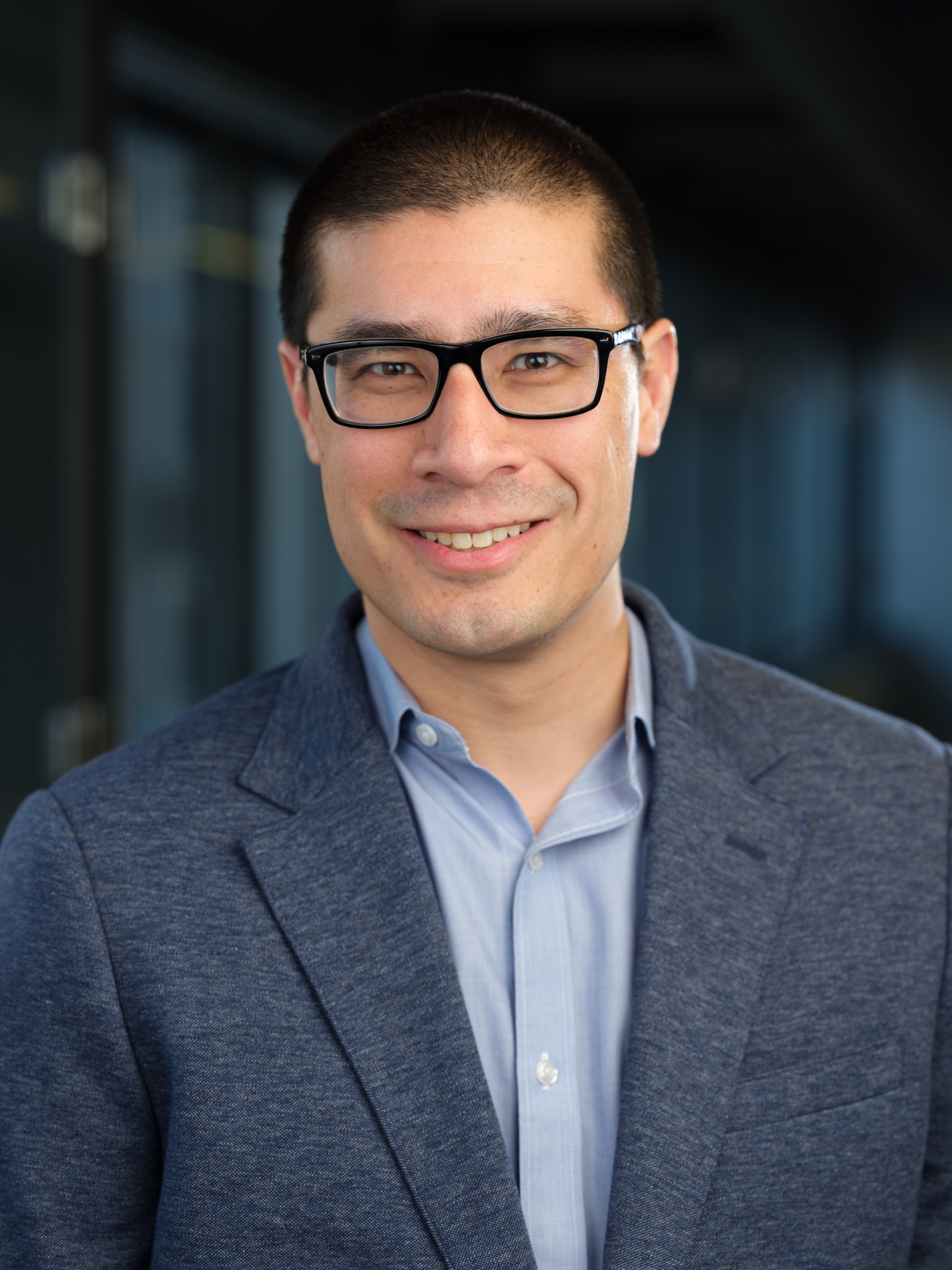 Machine learning has shown incredible promise in robotics, with some notable recent demonstrations in manipulation and sim2real transfer. These results, however, require either an accurate a priori model (for simulation) or a large amount of data. In contrast, my lab is focused on enabling robots to enter novel environments and then, with minimal time to gather information, accomplish complex tasks. In this talk, I will argue that the hybrid or contact-driven nature of real-world robotics, where a robot must safely and quickly interact with objects, drives this high data requirement. In particular, the inductive biases inherent in standard learning methods fundamentally clash with the non-differentiable physics of contact-rich robotics. Focusing on model learning, or system identification, I will show both empirical and theoretical results which demonstrate that contact stiffness leads to poor training and generalization, leading to some healthy skepticism of simulation experiments trained on artificially soft environments. Fortunately, implicit learning formulations, which embed convex optimization problems, can dramatically reshape the optimization landscape for these stiff problems. By carefully reasoning about the roles of stiffness and discontinuity, and integrating non-smooth structures, we demonstrate dramatically improved learning performance. Within this family of approaches, ContactNets accurately identifies the geometry and dynamics of a six-sided cube bouncing, sliding, and rolling across a surface from only a handful of sample trajectories. Similarly, a piecewise-affine hybrid system with thousands of modes can be identified purely from state transitions. Time permitting, I'll discuss how these learned models can be deployed for control via recent results in real-time, multi-contact MPC.
Machine learning has shown incredible promise in robotics, with some notable recent demonstrations in manipulation and sim2real transfer. These results, however, require either an accurate a priori model (for simulation) or a large amount of data. In contrast, my lab is focused on enabling robots to enter novel environments and then, with minimal time to gather information, accomplish complex tasks. In this talk, I will argue that the hybrid or contact-driven nature of real-world robotics, where a robot must safely and quickly interact with objects, drives this high data requirement. In particular, the inductive biases inherent in standard learning methods fundamentally clash with the non-differentiable physics of contact-rich robotics. Focusing on model learning, or system identification, I will show both empirical and theoretical results which demonstrate that contact stiffness leads to poor training and generalization, leading to some healthy skepticism of simulation experiments trained on artificially soft environments. Fortunately, implicit learning formulations, which embed convex optimization problems, can dramatically reshape the optimization landscape for these stiff problems. By carefully reasoning about the roles of stiffness and discontinuity, and integrating non-smooth structures, we demonstrate dramatically improved learning performance. Within this family of approaches, ContactNets accurately identifies the geometry and dynamics of a six-sided cube bouncing, sliding, and rolling across a surface from only a handful of sample trajectories. Similarly, a piecewise-affine hybrid system with thousands of modes can be identified purely from state transitions. Time permitting, I'll discuss how these learned models can be deployed for control via recent results in real-time, multi-contact MPC.
-
- Date: April 15, 2019
MERL Contact: Stefano Di Cairano
Research Area: Control
Brief - Stefano Di Cairano, senior team leader and distinguished research scientist in the Control and Dynamical Systems group, was interviewed in the April 2019 issue of IEEE Control Systems Magazine. Stefano described himself, promising opportunities in the control field, and how his passion for control research fits well into the industrial research laboratory setting at MERL. It is very good reading for any young researcher considering possible career trajectories.
-
- Date: January 2, 2019
Awarded to: Siheng Chen
Research Area: Signal Processing
Brief - MERL researcher, Siheng Chen, has won an IEEE Young Author Best Paper award for his paper entitled "Discrete Signal Processing on Graphs: Sampling Theory". This paper, published in the December 2015 issue of IEEE Transactions on Signal Processing, proposes a sampling theory for signals that are supported on either directed or undirected graphs. The theory follows the same paradigm as classical sampling theory and shows that perfect recovery is possible for graph signals bandlimited under the graph Fourier transform. The award honors the authors of an especially meritorious paper dealing with a subject related to IEEE's technical scope and appearing in one if its journals within a three year window of eligibility.
-
- Date & Time: Tuesday, December 13, 2016; Noon
Speaker: Yue M. Lu, John A. Paulson School of Engineering and Applied Sciences, Harvard University
MERL Host: Petros T. Boufounos
Research Areas: Computational Sensing, Machine Learning
Abstract 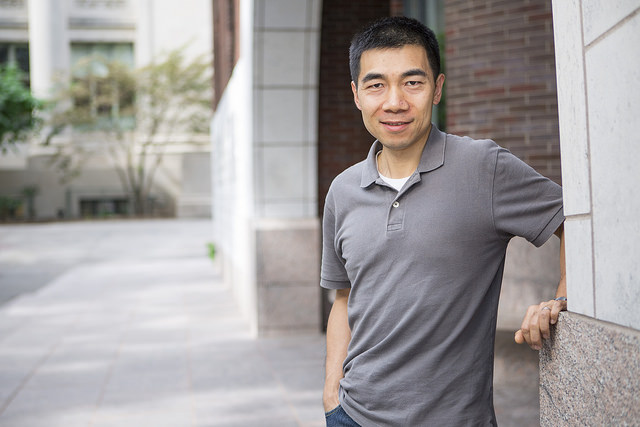 In this talk, we will present a framework for analyzing, in the high-dimensional limit, the exact dynamics of several stochastic optimization algorithms that arise in signal and information processing. For concreteness, we consider two prototypical problems: sparse principal component analysis and regularized linear regression (e.g. LASSO). For each case, we show that the time-varying estimates given by the algorithms will converge weakly to a deterministic "limiting process" in the high-dimensional limit. Moreover, this limiting process can be characterized as the unique solution of a nonlinear PDE, and it provides exact information regarding the asymptotic performance of the algorithms. For example, performance metrics such as the MSE, the cosine similarity and the misclassification rate in sparse support recovery can all be obtained by examining the deterministic limiting process. A steady-state analysis of the nonlinear PDE also reveals interesting phase transition phenomena related to the performance of the algorithms. Although our analysis is asymptotic in nature, numerical simulations show that the theoretical predictions are accurate for moderate signal dimensions.
In this talk, we will present a framework for analyzing, in the high-dimensional limit, the exact dynamics of several stochastic optimization algorithms that arise in signal and information processing. For concreteness, we consider two prototypical problems: sparse principal component analysis and regularized linear regression (e.g. LASSO). For each case, we show that the time-varying estimates given by the algorithms will converge weakly to a deterministic "limiting process" in the high-dimensional limit. Moreover, this limiting process can be characterized as the unique solution of a nonlinear PDE, and it provides exact information regarding the asymptotic performance of the algorithms. For example, performance metrics such as the MSE, the cosine similarity and the misclassification rate in sparse support recovery can all be obtained by examining the deterministic limiting process. A steady-state analysis of the nonlinear PDE also reveals interesting phase transition phenomena related to the performance of the algorithms. Although our analysis is asymptotic in nature, numerical simulations show that the theoretical predictions are accurate for moderate signal dimensions.
-
- Date & Time: Friday, December 2, 2016; 11:00 AM
Speaker: Prof. Waheed Bajwa, Rutgers University
MERL Host: Petros T. Boufounos
Research Area: Computational Sensing
Abstract 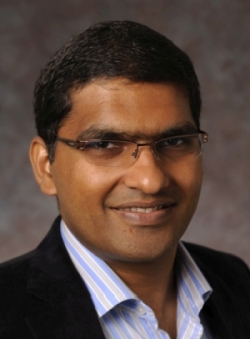 While distributed information processing has a rich history, relatively less attention has been paid to the problem of collaborative learning of nonlinear geometric structures underlying data distributed across sites that are connected to each other in an arbitrary topology. In this talk, we discuss this problem in the context of collaborative dictionary learning from big, distributed data. It is assumed that a number of geographically-distributed, interconnected sites have massive local data and they are interested in collaboratively learning a low-dimensional geometric structure underlying these data. In contrast to some of the previous works on subspace-based data representations, we focus on the geometric structure of a union of subspaces (UoS). In this regard, we propose a distributed algorithm, termed cloud K-SVD, for collaborative learning of a UoS structure underlying distributed data of interest. The goal of cloud K-SVD is to learn an overcomplete dictionary at each individual site such that every sample in the distributed data can be represented through a small number of atoms of the learned dictionary. Cloud K-SVD accomplishes this goal without requiring communication of individual data samples between different sites. In this talk, we also theoretically characterize deviations of the dictionaries learned at individual sites by cloud K-SVD from a centralized solution. Finally, we numerically illustrate the efficacy of cloud K-SVD in the context of supervised training of nonlinear classsifiers from distributed, labaled training data.
While distributed information processing has a rich history, relatively less attention has been paid to the problem of collaborative learning of nonlinear geometric structures underlying data distributed across sites that are connected to each other in an arbitrary topology. In this talk, we discuss this problem in the context of collaborative dictionary learning from big, distributed data. It is assumed that a number of geographically-distributed, interconnected sites have massive local data and they are interested in collaboratively learning a low-dimensional geometric structure underlying these data. In contrast to some of the previous works on subspace-based data representations, we focus on the geometric structure of a union of subspaces (UoS). In this regard, we propose a distributed algorithm, termed cloud K-SVD, for collaborative learning of a UoS structure underlying distributed data of interest. The goal of cloud K-SVD is to learn an overcomplete dictionary at each individual site such that every sample in the distributed data can be represented through a small number of atoms of the learned dictionary. Cloud K-SVD accomplishes this goal without requiring communication of individual data samples between different sites. In this talk, we also theoretically characterize deviations of the dictionaries learned at individual sites by cloud K-SVD from a centralized solution. Finally, we numerically illustrate the efficacy of cloud K-SVD in the context of supervised training of nonlinear classsifiers from distributed, labaled training data.
-
- Date & Time: Friday, September 23, 2016; 12:00 PM- 1:00 PM
Speaker: Dr. Earl McCune, Eridan Communications
Research Areas: Communications, Signal Processing
Abstract 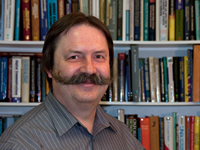 To maximize the operating energy efficiency of any wireless communication link requires a global optimization not only across the entire block diagram, but also including the selected signal modulation and aspects of the link operating protocol. Achieving this global optimization is first examined for the transmitter, receiver, and baseband circuitry. Then the important aspects of signal modulation necessary to access these circuit optimizations, with examples, are presented, followed by the correspondingly important protocol aspects needed. A metric called modulation-available energy efficiency (MAEE) compares proposed signals for compatibility with high energy efficiency objectives.
To maximize the operating energy efficiency of any wireless communication link requires a global optimization not only across the entire block diagram, but also including the selected signal modulation and aspects of the link operating protocol. Achieving this global optimization is first examined for the transmitter, receiver, and baseband circuitry. Then the important aspects of signal modulation necessary to access these circuit optimizations, with examples, are presented, followed by the correspondingly important protocol aspects needed. A metric called modulation-available energy efficiency (MAEE) compares proposed signals for compatibility with high energy efficiency objectives.
-
- Date: March 11, 2014
Awarded to: Yuuki Tachioka
Awarded for: "Effectiveness of discriminative approaches for speech recognition under noisy environments on the 2nd CHiME Challenge"
Awarded by: Acoustical Society of Japan (ASJ)
MERL Contact: Jonathan Le Roux
Research Area: Speech & Audio
Brief - MELCO researcher Yuuki Tachioka received the Awaya Prize Young Researcher Award from the Acoustical Society of Japan (ASJ) for "effectiveness of discriminative approaches for speech recognition under noisy environments on the 2nd CHiME Challenge", which was based on joint work with MERL Speech & Audio team researchers Shinji Watanabe, Jonathan Le Roux and John R. Hershey.
-
- Date: September 26, 2013
Awarded to: Jonathan Le Roux
Awarded for: "A new non-negative dynamical system for speech and audio modeling"
Awarded by: Acoustical Society of Japan (ASJ)
MERL Contact: Jonathan Le Roux
Research Area: Speech & Audio
-
- Date & Time: Friday, July 27, 2012; 12:00 PM
Speaker: Mingyuan Zhou, Duke University
MERL Host: Dehong Liu Abstract - Bayesian nonparametrics, using stochastic processes as prior distributions, is a relatively young and rapidly growing research area in statistics and machine learning. In this talk, we first briefly review completely random measures, a family of pure-jump non-negative stochastic processes that are simple to construct and amenable for posterior computation. We then present nonparametric Bayesian latent variable models based on the beta process, Bernoulli process, gamma process, Poisson process, and in particular, the negative binomial process. Specifically, for continuous data, we discuss dictionary learning with the beta-Bernoulli process and dependent hierarchical beta process, and for count data, we present the beta-negative binomial process and Poisson factor analysis. Furthermore, we discuss how the seeming disjoint count and mixture modelings can be united under the negative binomial processes framework, providing new opportunities to build mixture and hierarchical mixture models with better data fitting, more efficient inference and more flexible model constructions. We show successful applications of our nonparametric Bayesian latent variable models to image processing, topic modeling and count data analysis.
-
- Date & Time: Tuesday, July 10, 2012; 11:00 AM
Speaker: Prof Vineet Kamat, University of Michigan
Research Area: Computer Vision
Abstract - This talk will present ongoing research at the University of Michigan Laboratory for Interactive Visualization in Engineering (LIVE) that is exploring applications of mobile pervasive computing and visualization in design, engineering, and construction. Findings from three specific research projects will be presented: Interactive Visualization of Construction Operations in Mobile Outdoor Augmented Reality; Rapid Building Damage Evaluation using Augmented Reality and Structural Simulation; and Location-Aware Contextual Information Access and Retrieval for Rapid On-Site Decision Making. In each case, the development of fundamental algorithms, their implementation as reusable and modular software, and their implementation in the engineering applications will be described.
-
- Date: March 16, 2007
Awarded to: Michael Seltzer
Awarded for: "Likelihood-Maximizing Beamforming for Robust Hands-free Speech Recognition"
Awarded by: IEEE Signal Processing Society
Research Area: Speech & Audio
-
 Learning-enabled control systems have demonstrated impressive empirical performance on challenging control problems in robotics. However, this performance often arrives with the trade-off of diminished transparency and the absence of guarantees regarding the safety and stability of the learned controllers. In recent years, new techniques have emerged to provide these guarantees by learning certificates alongside control policies — these certificates provide concise, data-driven proofs that guarantee the safety and stability of the learned control system. These methods not only allow the user to verify the safety of a learned controller but also provide supervision during training, allowing safety and stability requirements to influence the training process itself. In this talk, we present two exciting updates on neural certificates. In the first work, we explore the use of graph neural networks to learn collision-avoidance certificates that can generalize to unseen and very crowded environments. The second work presents a novel reinforcement learning approach that can produce certificate functions with the policies while addressing the instability issues in the optimization process. Finally, if time permits, I will also talk about my group's recent work using LLM and domain-specific task and motion planners to allow natural language as input for robot planning.
Learning-enabled control systems have demonstrated impressive empirical performance on challenging control problems in robotics. However, this performance often arrives with the trade-off of diminished transparency and the absence of guarantees regarding the safety and stability of the learned controllers. In recent years, new techniques have emerged to provide these guarantees by learning certificates alongside control policies — these certificates provide concise, data-driven proofs that guarantee the safety and stability of the learned control system. These methods not only allow the user to verify the safety of a learned controller but also provide supervision during training, allowing safety and stability requirements to influence the training process itself. In this talk, we present two exciting updates on neural certificates. In the first work, we explore the use of graph neural networks to learn collision-avoidance certificates that can generalize to unseen and very crowded environments. The second work presents a novel reinforcement learning approach that can produce certificate functions with the policies while addressing the instability issues in the optimization process. Finally, if time permits, I will also talk about my group's recent work using LLM and domain-specific task and motion planners to allow natural language as input for robot planning. The explosive growth of machine learning and data-driven methodologies have revolutionized numerous fields. Yet, translating these successes to the domain of dynamical, physical systems remains a significant challenge, hindered by the complex and often unpredictable nature of such environments. Closing the loop from data to actions in these systems faces many difficulties, stemming from the need for sample efficiency and computational feasibility amidst intricate dynamics, along with many other requirements such as verifiability, robustness, and safety. In this talk, we bridge this gap by introducing innovative approaches that harness representation-based methods, domain knowledge, and the physical structures of systems. We present a comprehensive framework that integrates these components to develop reinforcement learning and control strategies that are not only tailored for the complexities of physical systems but also achieve efficiency, safety, and robustness with provable performance.
The explosive growth of machine learning and data-driven methodologies have revolutionized numerous fields. Yet, translating these successes to the domain of dynamical, physical systems remains a significant challenge, hindered by the complex and often unpredictable nature of such environments. Closing the loop from data to actions in these systems faces many difficulties, stemming from the need for sample efficiency and computational feasibility amidst intricate dynamics, along with many other requirements such as verifiability, robustness, and safety. In this talk, we bridge this gap by introducing innovative approaches that harness representation-based methods, domain knowledge, and the physical structures of systems. We present a comprehensive framework that integrates these components to develop reinforcement learning and control strategies that are not only tailored for the complexities of physical systems but also achieve efficiency, safety, and robustness with provable performance. This talk will cover a new generation of technologies that can sense, connect, and perceive the physical world in unprecedented ways. These technologies can uncover hidden worlds around us, promising transformative impact on areas spanning climate change monitoring, ocean mapping, healthcare, food security, supply chain, and even extraterrestrial exploration.
This talk will cover a new generation of technologies that can sense, connect, and perceive the physical world in unprecedented ways. These technologies can uncover hidden worlds around us, promising transformative impact on areas spanning climate change monitoring, ocean mapping, healthcare, food security, supply chain, and even extraterrestrial exploration.  Carbon capture, utilization, and storage (CCUS) is a promising pathway to decarbonize fossil-based power and industrial sectors and is a bridging technology for a sustainable transition to a net-zero emission energy future. This talk aims to provide an overview of design and optimization of CCUS systems. I will also attempt to give a brief perspective on emerging interests in process systems engineering research (e.g., systems integration, multiscale modeling, strategic planning, and optimization under uncertainty). The purpose is not to cover all aspects of PSE research for CCUS but rather to foster discussion by presenting some plausible future directions and ideas.
Carbon capture, utilization, and storage (CCUS) is a promising pathway to decarbonize fossil-based power and industrial sectors and is a bridging technology for a sustainable transition to a net-zero emission energy future. This talk aims to provide an overview of design and optimization of CCUS systems. I will also attempt to give a brief perspective on emerging interests in process systems engineering research (e.g., systems integration, multiscale modeling, strategic planning, and optimization under uncertainty). The purpose is not to cover all aspects of PSE research for CCUS but rather to foster discussion by presenting some plausible future directions and ideas. Machine learning has shown incredible promise in robotics, with some notable recent demonstrations in manipulation and sim2real transfer. These results, however, require either an accurate a priori model (for simulation) or a large amount of data. In contrast, my lab is focused on enabling robots to enter novel environments and then, with minimal time to gather information, accomplish complex tasks. In this talk, I will argue that the hybrid or contact-driven nature of real-world robotics, where a robot must safely and quickly interact with objects, drives this high data requirement. In particular, the inductive biases inherent in standard learning methods fundamentally clash with the non-differentiable physics of contact-rich robotics. Focusing on model learning, or system identification, I will show both empirical and theoretical results which demonstrate that contact stiffness leads to poor training and generalization, leading to some healthy skepticism of simulation experiments trained on artificially soft environments. Fortunately, implicit learning formulations, which embed convex optimization problems, can dramatically reshape the optimization landscape for these stiff problems. By carefully reasoning about the roles of stiffness and discontinuity, and integrating non-smooth structures, we demonstrate dramatically improved learning performance. Within this family of approaches, ContactNets accurately identifies the geometry and dynamics of a six-sided cube bouncing, sliding, and rolling across a surface from only a handful of sample trajectories. Similarly, a piecewise-affine hybrid system with thousands of modes can be identified purely from state transitions. Time permitting, I'll discuss how these learned models can be deployed for control via recent results in real-time, multi-contact MPC.
Machine learning has shown incredible promise in robotics, with some notable recent demonstrations in manipulation and sim2real transfer. These results, however, require either an accurate a priori model (for simulation) or a large amount of data. In contrast, my lab is focused on enabling robots to enter novel environments and then, with minimal time to gather information, accomplish complex tasks. In this talk, I will argue that the hybrid or contact-driven nature of real-world robotics, where a robot must safely and quickly interact with objects, drives this high data requirement. In particular, the inductive biases inherent in standard learning methods fundamentally clash with the non-differentiable physics of contact-rich robotics. Focusing on model learning, or system identification, I will show both empirical and theoretical results which demonstrate that contact stiffness leads to poor training and generalization, leading to some healthy skepticism of simulation experiments trained on artificially soft environments. Fortunately, implicit learning formulations, which embed convex optimization problems, can dramatically reshape the optimization landscape for these stiff problems. By carefully reasoning about the roles of stiffness and discontinuity, and integrating non-smooth structures, we demonstrate dramatically improved learning performance. Within this family of approaches, ContactNets accurately identifies the geometry and dynamics of a six-sided cube bouncing, sliding, and rolling across a surface from only a handful of sample trajectories. Similarly, a piecewise-affine hybrid system with thousands of modes can be identified purely from state transitions. Time permitting, I'll discuss how these learned models can be deployed for control via recent results in real-time, multi-contact MPC. In this talk, we will present a framework for analyzing, in the high-dimensional limit, the exact dynamics of several stochastic optimization algorithms that arise in signal and information processing. For concreteness, we consider two prototypical problems: sparse principal component analysis and regularized linear regression (e.g. LASSO). For each case, we show that the time-varying estimates given by the algorithms will converge weakly to a deterministic "limiting process" in the high-dimensional limit. Moreover, this limiting process can be characterized as the unique solution of a nonlinear PDE, and it provides exact information regarding the asymptotic performance of the algorithms. For example, performance metrics such as the MSE, the cosine similarity and the misclassification rate in sparse support recovery can all be obtained by examining the deterministic limiting process. A steady-state analysis of the nonlinear PDE also reveals interesting phase transition phenomena related to the performance of the algorithms. Although our analysis is asymptotic in nature, numerical simulations show that the theoretical predictions are accurate for moderate signal dimensions.
In this talk, we will present a framework for analyzing, in the high-dimensional limit, the exact dynamics of several stochastic optimization algorithms that arise in signal and information processing. For concreteness, we consider two prototypical problems: sparse principal component analysis and regularized linear regression (e.g. LASSO). For each case, we show that the time-varying estimates given by the algorithms will converge weakly to a deterministic "limiting process" in the high-dimensional limit. Moreover, this limiting process can be characterized as the unique solution of a nonlinear PDE, and it provides exact information regarding the asymptotic performance of the algorithms. For example, performance metrics such as the MSE, the cosine similarity and the misclassification rate in sparse support recovery can all be obtained by examining the deterministic limiting process. A steady-state analysis of the nonlinear PDE also reveals interesting phase transition phenomena related to the performance of the algorithms. Although our analysis is asymptotic in nature, numerical simulations show that the theoretical predictions are accurate for moderate signal dimensions. While distributed information processing has a rich history, relatively less attention has been paid to the problem of collaborative learning of nonlinear geometric structures underlying data distributed across sites that are connected to each other in an arbitrary topology. In this talk, we discuss this problem in the context of collaborative dictionary learning from big, distributed data. It is assumed that a number of geographically-distributed, interconnected sites have massive local data and they are interested in collaboratively learning a low-dimensional geometric structure underlying these data. In contrast to some of the previous works on subspace-based data representations, we focus on the geometric structure of a union of subspaces (UoS). In this regard, we propose a distributed algorithm, termed cloud K-SVD, for collaborative learning of a UoS structure underlying distributed data of interest. The goal of cloud K-SVD is to learn an overcomplete dictionary at each individual site such that every sample in the distributed data can be represented through a small number of atoms of the learned dictionary. Cloud K-SVD accomplishes this goal without requiring communication of individual data samples between different sites. In this talk, we also theoretically characterize deviations of the dictionaries learned at individual sites by cloud K-SVD from a centralized solution. Finally, we numerically illustrate the efficacy of cloud K-SVD in the context of supervised training of nonlinear classsifiers from distributed, labaled training data.
While distributed information processing has a rich history, relatively less attention has been paid to the problem of collaborative learning of nonlinear geometric structures underlying data distributed across sites that are connected to each other in an arbitrary topology. In this talk, we discuss this problem in the context of collaborative dictionary learning from big, distributed data. It is assumed that a number of geographically-distributed, interconnected sites have massive local data and they are interested in collaboratively learning a low-dimensional geometric structure underlying these data. In contrast to some of the previous works on subspace-based data representations, we focus on the geometric structure of a union of subspaces (UoS). In this regard, we propose a distributed algorithm, termed cloud K-SVD, for collaborative learning of a UoS structure underlying distributed data of interest. The goal of cloud K-SVD is to learn an overcomplete dictionary at each individual site such that every sample in the distributed data can be represented through a small number of atoms of the learned dictionary. Cloud K-SVD accomplishes this goal without requiring communication of individual data samples between different sites. In this talk, we also theoretically characterize deviations of the dictionaries learned at individual sites by cloud K-SVD from a centralized solution. Finally, we numerically illustrate the efficacy of cloud K-SVD in the context of supervised training of nonlinear classsifiers from distributed, labaled training data. To maximize the operating energy efficiency of any wireless communication link requires a global optimization not only across the entire block diagram, but also including the selected signal modulation and aspects of the link operating protocol. Achieving this global optimization is first examined for the transmitter, receiver, and baseband circuitry. Then the important aspects of signal modulation necessary to access these circuit optimizations, with examples, are presented, followed by the correspondingly important protocol aspects needed. A metric called modulation-available energy efficiency (MAEE) compares proposed signals for compatibility with high energy efficiency objectives.
To maximize the operating energy efficiency of any wireless communication link requires a global optimization not only across the entire block diagram, but also including the selected signal modulation and aspects of the link operating protocol. Achieving this global optimization is first examined for the transmitter, receiver, and baseband circuitry. Then the important aspects of signal modulation necessary to access these circuit optimizations, with examples, are presented, followed by the correspondingly important protocol aspects needed. A metric called modulation-available energy efficiency (MAEE) compares proposed signals for compatibility with high energy efficiency objectives.